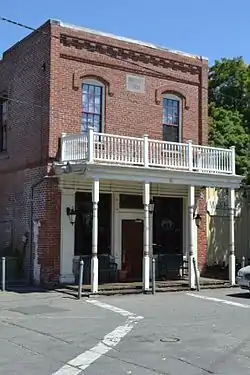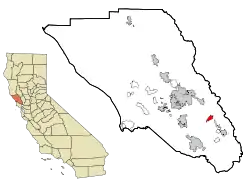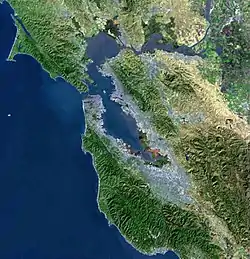Glen Ellen, California
Glen Ellen is a census-designated place (CDP) in Sonoma Valley, Sonoma County, California, United States. The population was 784 at the 2010 census, down from 992 at the 2000 census. Glen Ellen is the location of Jack London State Historic Park (including the Wolf House), Sonoma Valley Regional Park, and a former home of Hunter S. Thompson.
Glen Ellen | |
|---|---|
 Glen Ellen Saloon | |
 Location in Sonoma County and the state of California | |
 Glen Ellen Location in the United States | |
| Coordinates: 38°21′52″N 122°31′52″W[1] | |
| Country | |
| State | |
| County | Sonoma |
| Area | |
| • Total | 2.103 sq mi (5.448 km2) |
| • Land | 2.102 sq mi (5.445 km2) |
| • Water | 0.001 sq mi (0.003 km2) 0.05% |
| Elevation | 253 ft (77 m) |
| Population | |
| • Total | 784 |
| • Density | 370/sq mi (140/km2) |
| Time zone | UTC-8 (Pacific) |
| • Summer (DST) | UTC-7 (PDT) |
| ZIP code | 95442 |
| Area code | 707 |
| FIPS code | 06-30028 |
| GNIS feature ID | 277524 |
The whole of Glen Ellen was severely damaged by the Nuns Fire during the October 2017 Northern California wildfires.
History
.jpg.webp)
In 1859, Charles V. Stuart purchased a part of the Rancho Agua Caliente land grant and in 1868 began building a house there, eventually establishing a 1,000-acre (4.0 km2) vineyard he named Glen Ellen after his wife. The town that grew up around the vineyard also came to be called Glen Ellen, and Stuart's home was later renamed Glen Oaks Ranch.
In October 2017, the area was badly affected by wildfire.[5]
Geography
Glen Ellen is about 6 miles (9.7 km) northwest of the city of Sonoma. The United States Census Bureau fixes the total area at 2.1 square miles (5.4 km2), 99.95% of it land and 0.05% covered by water. Sonoma Creek, the principal river of the Sonoma Valley, flows through Glen Ellen.
Demographics
| Census | Pop. | Note | %± |
|---|---|---|---|
| U.S. Decennial Census[6] | |||
2010
The 2010 United States Census[4] reported that Glen Ellen had a population of 784. The population density was 372.7 inhabitants per square mile (143.9/km2). The racial makeup of Glen Ellen was 693 (88.4%) White, 3 (0.4%) African American, 9 (1.1%) Native American, 16 (2.0%) Asian, 3 (0.4%) Pacific Islander, 18 (2.3%) from other races, and 42 (5.4%) from two or more races. Hispanic or Latino of any race were 67 persons (8.5%).
The Census reported that 98.3% of the population lived in households and 1.7% lived in non-institutionalized group quarters.
There were 364 households, out of which 74 (20.3%) had children under the age of 18 living in them, 172 (47.3%) were opposite-sex married couples living together, 26 (7.1%) had a female householder with no husband present, 14 (3.8%) had a male householder with no wife present. There were 23 (6.3%) unmarried opposite-sex partnerships, and 6 (1.6%) same-sex married couples or partnerships. 122 households (33.5%) were made up of individuals, and 34 (9.3%) had someone living alone who was 65 years of age or older. The average household size was 2.12. There were 212 families (58.2% of all households); the average family size was 2.67.
The population was spread out, with 126 people (16.1%) under the age of 18, 37 people (4.7%) aged 18 to 24, 142 people (18.1%) aged 25 to 44, 376 people (48.0%) aged 45 to 64, and 103 people (13.1%) who were 65 years of age or older. The median age was 51.4 years. For every 100 females, there were 103.6 males. For every 100 females age 18 and over, there were 101.2 males.
There were 421 housing units at an average density of 200.2 per square mile (77.3/km2), of which 60.4% were owner-occupied and 39.6% were occupied by renters. The homeowner vacancy rate was 1.3%; the rental vacancy rate was 4.0%. 60.5% of the population lived in owner-occupied housing units and 37.9% lived in rental housing units.
2000
As of the census[7] of 2000, there were 992 people, 340 households, and 219 families residing in the CDP. The population density was 473 inhabitants per square mile (183/km2). There were 387 housing units at an average density of 185/sq mi (71/km2). The racial makeup of the CDP was 89.4% White, 1.9% African American, 1.2% Native American, 1.2% Asian, 0.40% Pacific Islander, 2.7% from other races, and 3.1% from two or more races. 8.5% of the population were Hispanic.
There were 340 households, out of which 34.7% had children under the age of 18, 49.4% were married couples living together, 10.6% had a female householder with no husband present, and 35.3% were non-families. 25.0% of all households consisted of individuals, and 3.8% had someone living alone who was 65 or older. The average household size was 2.39 and the average family size was 2.91. The age distribution was as follows: 28.6% under the age of 18, 5.3% from 18 to 24, 23.9% from 25 to 44, 33.9% from 45 to 64, and 8.3% who were 65 years of age or older. The median age was 41 years. For every 100 females, there were 120.9 males. For every 100 females age 18 and over, there were 98.3 males.
The median income for a household in the CDP was $52,143, and the median income for a family was $54,219. Males had a median income of $50,714 versus $35,952 for females. The per capita income for the CDP was $22,680. About 11.5% of families and 14.8% of the population were below the poverty line, including 16.8% of those under age 18 and none of those age 65 or over.
Points of interest
Writer Jack London lived in Glen Ellen from 1909 to his death in 1916, where he devoted much of his time to development of his Beauty Ranch and the building of his mansion, Wolf House. Many of his novels and stories, notably The Iron Heel and The Valley of the Moon mention Glen Ellen and Sonoma County. ("The Valley of the Moon" is a translation of Sonoma Valley's name given by the Pomo and Coast Miwok peoples.)
The site of his ranch is now Jack London State Historic Park, which contains the ruins of Wolf House, several ranch buildings, the grave of Jack and Charmian London, and a museum housed in Charmian London's "House of Happy Walls".
The Sonoma Developmental Center is located just outside Glen Ellen near the Jack London ranch. Its predecessor, the California Home for the Care and Training of Feeble Minded Children, was the setting for Jack London's story "Told in the Drooling Ward."
Glen Ellen is located in the Wine Country and is part of the Sonoma Mountain AVA. Like all the communities in Sonoma Valley, Glen Ellen is home to many vineyards and wineries including B.R. Cohn Winery, Benziger Family Winery, Mayo Family Winery, and Valley of the Moon Winery.
Quarryhill Botanic Garden, located near Glen Ellen, is a research botanical garden housing with one of the largest collections of temperate Asian plants in North America. Quarryhill's collection includes rare species such as Acer pentaphyllum, Cornus capitata, Holboellia coriacea, Illicium simonsii, and Rosa chinensis var. spontanea, all native to Sichuan, China, as well as extensive collections of various wild Asian dogwoods, lilies, magnolias, maples, oaks, roses, and rhododendrons. Quarryhill is open to the public.
Dunbar School is the second oldest school in California.[8] Currently it comprises grades K-5 and is part of the Sonoma Valley Unified School District.
Government
In the California State Legislature, Glen Ellen is in the 2nd Senate District, represented by Democrat Mike McGuire, and in the 4th Assembly District, represented by Democrat Cecilia Aguiar-Curry.[9]
In the United States House of Representatives, Glen Ellen is in California's 5th congressional district, represented by Republican Tom McClintock.[10]
Notable people
- Mary Ellen Pleasant, Abolitionist, Entrepreneur
- M. F. K. Fisher, food writer
- Albert E. Kahn, journalist, photographer, and author
- Bernie Krause, musician and soundscape ecologist[5]
- John Lasseter, animator, film director, screenwriter, and producer
- Jack London, novelist, journalist, and social activist
- Hunter S. Thompson, journalist and author
- Nikita Ducarroz, BMX freestyle cyclist and Olympic medalist
See also
References
- "US Gazetteer files: 2010, 2000, and 1990". United States Census Bureau. February 12, 2011. Retrieved April 23, 2011.
- "2010 Census U.S. Gazetteer Files – Places – California". United States Census Bureau.
- "Glen Ellen". Geographic Names Information System. United States Geological Survey, United States Department of the Interior. Retrieved February 25, 2015.
- "2010 Census Interactive Population Search: CA - Glen Ellen CDP". U.S. Census Bureau. Archived from the original on July 15, 2014. Retrieved July 12, 2014.
- Jones, Kevin L. (October 11, 2017). "Bernie Krause's Equipment, Decades of Musical Memorabilia Lost in Fires". KQED Arts. Retrieved October 12, 2017.
- "Census of Population and Housing". Census.gov. Retrieved June 4, 2016.
- "U.S. Census website". United States Census Bureau. Retrieved January 31, 2008.
- "A Glen Ellen Timeline". Glen Ellen Historical Society. Retrieved September 1, 2013.
- "Statewide Database". UC Regents. Archived from the original on February 1, 2015. Retrieved December 5, 2014.
- "California's 5th Congressional District - Representatives & District Map". Civic Impulse, LLC. Retrieved March 8, 2013.

